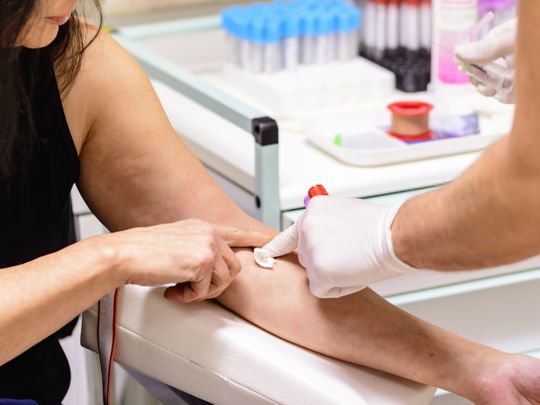
Abu Dhabi: Even though a study has suggested that people of certain blood groups are more at risk of contracting COVID-19, doctors in the UAE cautioned residents against coronavirus containment measures like handwashing and social distancing.
They pointed out that the Chinese study, conducted on 2,173 COVID-19 patients in Wuhan and Shenzen, had a small sample size compared to the number of patients worldwide, and did not account for other variables like age, ethnicity and pre-existing health conditions.

“Everyone should adhere to already proven methods of averting infection, especially as these results of the [Wuhan University study] are only preliminary results. Larger randomised controlled trials with peer review will be needed before these results can be substantiated, but everyone should adhere to already proven methods of infection control, like practising hand hygiene, limiting outdoor travel and avoiding public gatherings,” Dr Akansha Gandhi, clinical pathology specialist at Aster Hospital, Mankhool told Gulf News.
The study, conducted at the Evidence-Based and Translational Medicine at Zhongnan Hospital of Wuhan University, claims that patients with blood type A had a higher rate of infection by the novel coronavirus, and also suffered more severe symptoms. In contrast, patients with blood group O had a significantly lower risk for the infectious disease.
Authors for the study concluded that people with blood type A might therefore need particularly strengthened personal protection to reduce the chance of infection, and more vigilant surveillance and treatment if infected.
As Dr Gandhi said however, the paper is yet to be peer-reviewed, which is the golden standard for scientific research.

Dr Mohamad Mooty, department chair for infectious diseases at Cleveland Clinic Abu Dhabi’s Medical Subspecialty Institute, added that the study does not explain how blood type can affect the seriousness of the disease.
“While it is an interesting observation, the sample size [of about 2,000 patients] is relatively small given the fact that there are over 180,000 confirmed cases worldwide. I would [therefore] not rely on this study as a valid reason for people with specific blood types to take different precautions to those that have been recommended to the entire population,” the doctor explained.
Worldwide, O-positive is the most common blood type, followed by A-positive, but this differs based on country. Blood-type differences have been observed and reported in other infectious diseases like recurrent urinary tract infects, malaria, hepatitis B and even severe acute respiratory syndrome, which, like COVID-2, is also caused by a coronavirus.
“Various membrane receptors are being speculated and studied for their potential role in COVID_19 infections, including the blood group membrane glycoproteins [that lead to different blood types]. These proteins could serve as entry points for the virus into the cells,” Dr Gandhi explained.
But she stressed that any blood type results are only preliminary.
“[It is established] that certain groups of people are already prone to more severe infections, such as cardiac patients, diabetics, hypertensive patients, the elderly, people with chronic lung disease and immunocompromised individuals. [They should practise] stringent adherence to preventive measures, and everyone should be avoided by everyone at the moment,” she added.

Dr Shilpa Murthy, general physician at Aster Clinic, Arabian Ranches, also assured residents with blood type A.
“There is no need to panic because being of blood type A does not mean you will be infected, just as it doesn’t mean you are absolutely safe if you are type O. You still need to wash your hands and follow all guidelines issued by the authorities,” she added.












